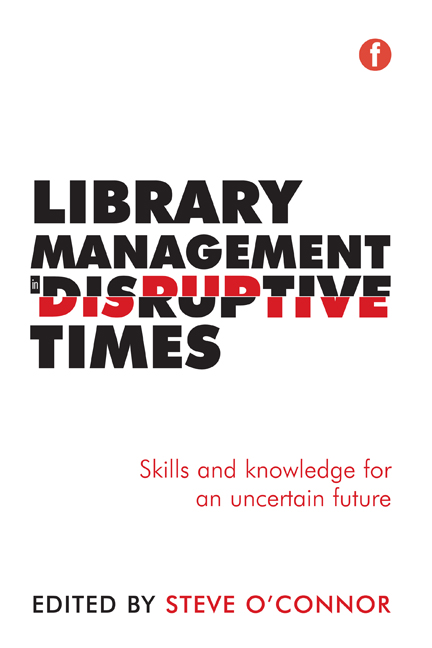Book contents
- Frontmatter
- Contents
- Contributors
- Introduction
- 1 Leading change: knowledge for success
- 2 Management fads and fashions and their impact on the LIS community
- 3 The Five Rules of Engagement for librarians: aux Ranganathan's laws of library science
- 4 Library management, disruption and consortia: an Australian example
- 5 No regrets; just lessons: economic crisis is changing our life and the management of libraries
- 6 Introducing agile principles and management to a library organization
- 7 The role of professional associations in changing times
- 8 And the walls came tumbling down ... The library profession confronts all-invasive new managerialism
- 9 What is behind the meaning of disruption? Or, thinking of management strategies from the outside
- Index
1 - Leading change: knowledge for success
Published online by Cambridge University Press: 08 June 2018
- Frontmatter
- Contents
- Contributors
- Introduction
- 1 Leading change: knowledge for success
- 2 Management fads and fashions and their impact on the LIS community
- 3 The Five Rules of Engagement for librarians: aux Ranganathan's laws of library science
- 4 Library management, disruption and consortia: an Australian example
- 5 No regrets; just lessons: economic crisis is changing our life and the management of libraries
- 6 Introducing agile principles and management to a library organization
- 7 The role of professional associations in changing times
- 8 And the walls came tumbling down ... The library profession confronts all-invasive new managerialism
- 9 What is behind the meaning of disruption? Or, thinking of management strategies from the outside
- Index
Summary
Introduction
Library Management in Disruptive Times, the title of this book, brings to mind the (probably apocryphal) curse ‘May you live in interesting times!’ For libraries and librarians the current times, and those of the past several decades, have indeed been interesting and challenging. The advent and rapid growth of the internet has brought fundamental changes in information-seeking behaviours and has revolutionized the way in which libraries operate. As recently as the mid-1990s, libraries and librarians were the primary gateways and gatekeepers to information. Now they operate in circumstances where, if they are to remain relevant and viable, they have to embrace major change. Not to do so risks shrinking relevance – even redundancy. A conference held in 2006 in Hong Kong captured well the reality of this dynamic, posing the question: ‘Are libraries and librarians like a dinosaur, or a phoenix? Will they die or will they fly?’
For managers of libraries to survive and prosper in disruptive times the capacity to lead, and to manage change is critical. If libraries are to be phoenix-like, to ‘fly’, they need to join into the flow of the massive disruptions brought about by new information technologies and changes in the information-seeking behaviours of library clients. They must be able to change. Survival will require innovation, diversification, flexibility and the capacity to keep on changing. Change can bring reinvention and new relevance. Failure to implement effective change carries the risk of, at best, mediocrity; more likely, a lingering decline into irrelevance. Failure to change, to remain relevant and valued by their clients, translates to a very real risk of redundancy, and the fate of the dinosaurs.
To survive and prosper, library managers need to know how to change. They need to recognize when change is needed, to be able to lead and sustain change, and to keep change alive and ongoing. The statistics on the effectiveness of change initiatives can, however, be disheartening. Estimates of the failure rate of organizational change initiatives, failure in full or in part, are as high as 70% (Kotter, 1995). However, despite those gloomy statistics, effective change can be achieved.
- Type
- Chapter
- Information
- Library Management in Disruptive TimesSkills and knowledge for an uncertain future, pp. 1 - 20Publisher: FacetPrint publication year: 2015



